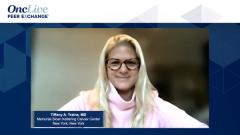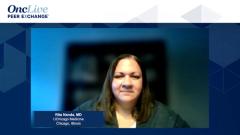
Managing Chemotherapy-Induced Neutropenia With G-CSFs
Recommendations for intervening with growth factor support and important considerations for reducing or discontinuing anti-cancer therapy when patients show signs of neutropenia.
Episodes in this series

Hope S. Rugo, MD, FASCO: When we’re looking at when we would intervene if you have a neutropenic patient, what’s the standard of how you would intervene? Do you first reduce dose intensity? Do you stop therapy or change therapy? Do you give the growth factor? How do you manage this? Have you had any patients for whom you had to discontinue chemotherapy or reduce their dose because of chemotherapy-induced neutropenia, Rita?
Rita Nanda, MD: Obviously, there are differences in how I manage neutropenia if I’m treating a patient with curative intent. As Bill mentioned, we don’t want to compromise the dose density and dose intensity of what we’re administering to our patients. Consequently, in those cases I’m pretty aggressive with growth factor. I would use a lot of weekly paclitaxel and start to incorporate weekly carboplatin into the mix. I incorporate growth factor for a few days at least after each weekly dose.
Then in the anthracycline-based portion of the treatment, I use the on-body delivery system to make it a little easier for patients. One thing that always comes up is insurance coverage, and often times the insurance company dictates which agent is used.
In the advanced cancer setting, it depends on how patients are tolerating their therapy, so above and beyond the neutropenia. Is it pan-cytopenia? Are platelets an issue that require a dose reduction? Are they tolerating the therapy well? What’s their disease burden? I factor all those things into account. If I have somebody with a lot of bulky disease and they’re very symptomatic, I try to maintain the dose intensity that I’m giving. I want to keep the patient on schedule, so I’ll incorporate growth factor pretty aggressively. If I have somebody who’s having other symptoms and adverse effects, such as fatigue and low platelets and they’re requiring all these transfusions, then I’ll dose reduce and use growth factor as needed. It depends on the patient’s clinical situation. But in the curative setting, I aggressively treat the neutropenia to keep patients on schedule.
William J. Gradishar, MD: We all have those patients in the advanced disease setting, where their marrows just get tired. If they’ve been fortunate enough to get many different regimens, then their marrow has just been exposed to so much, which oftentimes limits what we can do with them, even with growth factor support. It just doesn’t do the trick anymore.
Hope S. Rugo, MD, FASCO: You make a big differential between early and late-stage disease, which is important in terms of thinking about how aggressive we are. I do sometimes see people who don’t, for example, get their fourth dose of neoadjuvant AC [doxorubicin hydrochloride, cyclophosphamide] because of neutropenia. I agree with Rita that we tend not to do that so much in clinical practice.
Transcript edited for clarity.




































